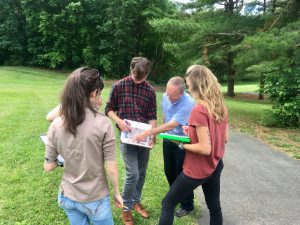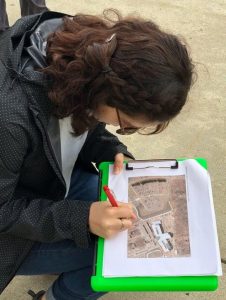
If you were out and about in the towns of North Haven, Milford, Hamden, West Haven or Cheshire this summer, you may have seen a team of four young adults writing on clipboards, snapping pictures of parking lots, laying their phones down on the sidewalk, and peering down into storm drains. These four intrepid UConn undergrads, nicknamed the Stormwater Corps, were evaluating opportunities for “disconnecting” stormwater through the use of green stormwater infrastructure (GSI) practices such as rain gardens, bioswales, and pervious pavements. Such practices help to infiltrate stormwater runoff into the ground, reducing flooding and water pollution.

The students, trained by CLEAR’s water (NEMO) team, were tasked with using a combination of online mapping technology and good old-fashioned field work to look for “low-hanging fruit” – sites in each town where green stormwater practices were likely to be most feasible, have the greatest impact, and be cost-effective. Their findings were compiled into a report complete with aerial photos and stormwater reduction estimates, and presented by the team to key municipal staff in each town with an emphasis on the “top five” potential sites. The Stormwater Corps project, supported by a grant from the Long Island Sound Futures Fund of the National Fish and Wildlife Foundation, includes funds for each of the five towns to put toward construction of their top priority GSI practice. The town officials have all chosen their top priority project, and we hope to begin construction in the late spring. CLEAR’s goal is to combine a semester-long stormwater/GSI class with a second semester patterned after the Stormwater Corps field work, forming a fully realized third “Corps” program to add to the Climate Corps and Brownfields Corps.
Speaking of the Climate Corps, three student teams are now working on stormwater projects this spring as part of the Independent Study semester of the program. Two teams are doing work very similar to the original Stormwater Corps, mapping and identifying GSI opportunities in the towns of Stonington and Mansfield. The third team is working with the City of Norwich on a strategic plan to help city officials comply with the newly strengthened “MS4” stormwater regulation, which requires regulated towns to reduce the amount of “directly connected” impervious cover by 2%. Stay tuned for how these three new projects are working out!